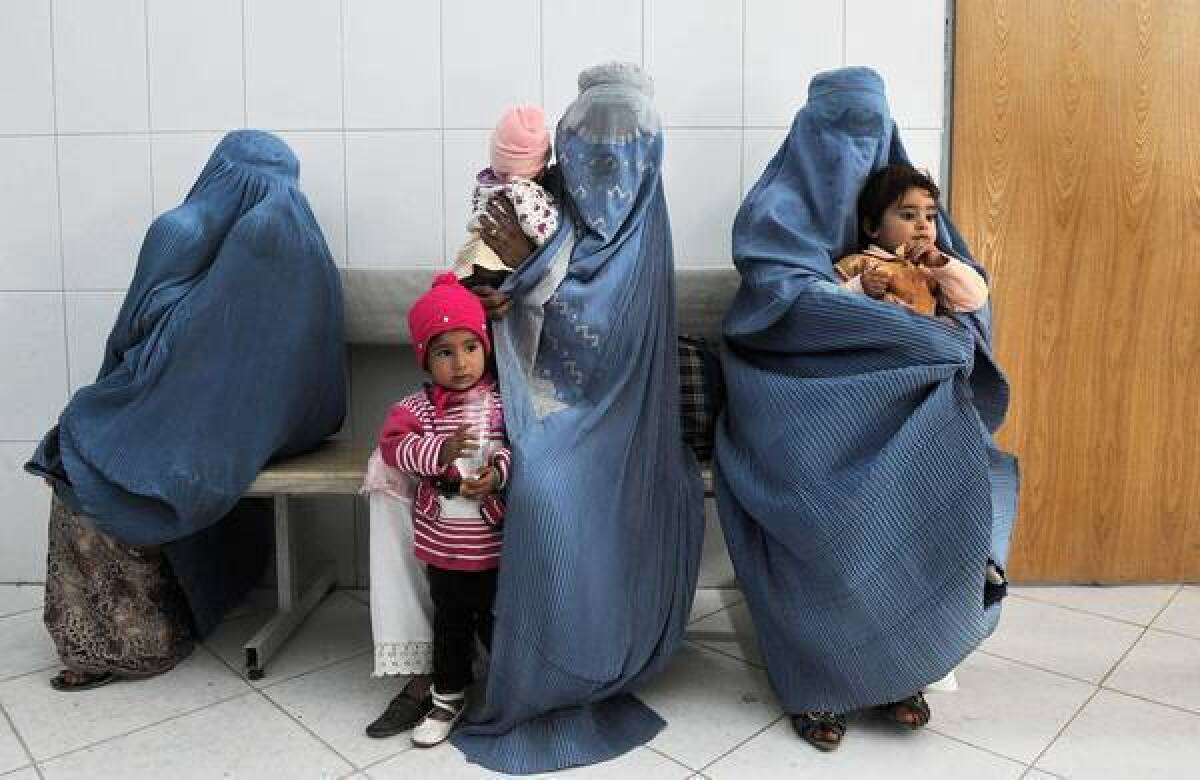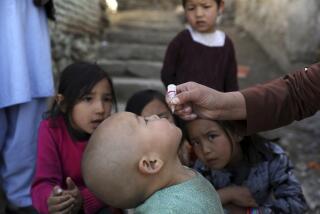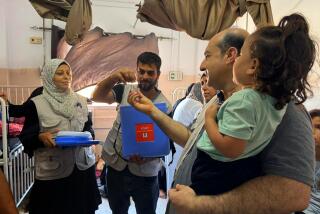Slaying of Afghan polio program worker raises questions

- Share via
KABUL, Afghanistan — In her small village of Kalota, north of Kabul, the young woman named Hanisa was known to be headstrong and independent. At 22, she had persevered in school long enough to reach 12th grade, and she was determined to flout tradition and work outside her home.
Hanisa had just left her house Saturday and was on her way to her first day of work as a village vaccination worker when three men on two motorcycles roared up behind her. She was shot at least six times and collapsed, bleeding profusely from abdominal wounds, according to Qais Qadiri, a spokesman for the governor’s office in Kapisa province. Within hours, she was dead.
The violent death of a young woman in Afghanistan is hardly a rare event. Women are frequently the victims of both domestic and politically motivated violence, the latter often committed by the Taliban. Although the Taliban has a history of opposing vaccination programs, which it sees as a Western plot, no group has yet claimed responsibility for Hanisa’s death, and it is unclear what motivated her attackers.
What is known is this: Hanisa had volunteered to work for a provincial health agency that vaccinates village children in Kapisa province against polio. She took a two-day training course and was reporting for work Saturday morning when she was attacked. She apparently had her family’s blessing.
Cases of “extreme or brutal violence against women” have increased in recent months, Women’s Affairs Minister Husn Banu Ghazanfar said last month. She cited more than 3,500 reported cases of violence against Afghan women in the first six months of this year.
Girls and women who flee forced marriages are regularly tracked down and killed, often by male relatives.
The Taliban has burned or bombed girls’ schools. The militants have poisoned schoolgirls or thrown acid in their faces. In August, two young women were beheaded in a Taliban-controlled district in the southern province of Helmand, and a 14-year-old girl was beheaded in October in Kunduz province in the north.
But in recent memory, no young Afghan woman has been reported killed while taking part in polio vaccinations.
“We have female groups who go out in very dangerous districts of Kapisa province, but they have never been threatened by anyone not to do vaccinations,” Dr. Mirza Mohammad Reja, director of the Kapisa provincial health department, said Wednesday. “They have the people’s full support.”
Saifoora Koohestani, director of women’s affairs in Kapisa, said she did not believe that Taliban militants were responsible because they are not active in the area. She said she deeply regretted Hanisa’s death and demanded that police track down and punish the killers.
Such crimes are rarely solved in Afghanistan, however.
Gen. Abdul Hamid Erkin, Kapisa’s chief of police, said the Taliban had no role in the slaying “because this area is safe and the Taliban can’t get in here.”
Reja said he was not certain that Hanisa’s involvement in the vaccination program was a factor in her death.
The Taliban, which typically sends text messages to Afghan journalists claiming responsibility for bombings and attacks, made no mention of the slaying in text messages or on the group’s website. A Taliban spokesman did not respond to calls requesting comment.
The Taliban has condemned polio eradication programs in Pakistan and parts of Afghanistan, portraying them as covers for Western spying or domination.
The militants became more suspicious of vaccination programs after a Pakistani doctor aiding the CIA used one such program as a ruse in an attempt to obtain DNA from Al Qaeda leader Osama bin Laden’s residence in Abbottabad, Pakistan. The DNA was never obtained, but the doctor, Shakeel Afridi, was sentenced to 33 years in prison this year.
In June, the Taliban banned polio vaccinations in two tribal districts of Pakistan near the Afghan border. Earlier, angry residents threatened and drove away vaccination teams in Pakistan’s remote tribal areas, accusing them of spying.
Violence against women is endemic in Afghanistan and parts of Pakistan. The issue gained prominence in Pakistan this year when Malala Yousafzai, a 15-year-old activist, survived a Taliban assassination attempt after speaking out for the education of girls. The shooting outraged many Pakistanis and served as a rallying point for women’s rights.
Hanisa’s death may also have prompted defiant support for her cause in Afghanistan. Not only did vaccinations continue in the area, but Reja also said Wednesday that dozens of residents had volunteered to help with them since the slaying.
Qadiri, the governor’s spokesman, said Hanisa was alive when she arrived at a clinic. Doctors there decided to send her to a more modern hospital in Kabul, the Afghan capital, “but unfortunately the girl died on the way,” Qadiri said.
Hanisa, who was in her final year of school, was a member of “an educated and modern family” that fully supported her desire to work outside the home, including traveling to sometimes dangerous areas to vaccinate children, said Erkin, the police chief.
He described most residents as “open-minded” and not opposed to vaccination programs. In initial interviews with police, he said, family members said they knew of no one who disliked Hanisa or objected to her working for the program.
Hanisa’s relatives declined to be interviewed.
Three Afghan journalists from two provincial radio stations were accompanied by police to interview the family Tuesday, Qadiri said. But Hanisa’s brothers and other male relatives became enraged and beat the journalists despite the police presence.
Afghans normally buried their dead within a day. But Hanisa’s body remained in the morgue, awaiting an autopsy as part of a police investigation of her death, Erkin said.
Baktash is a special correspondent.
More to Read
Sign up for Essential California
The most important California stories and recommendations in your inbox every morning.
You may occasionally receive promotional content from the Los Angeles Times.













